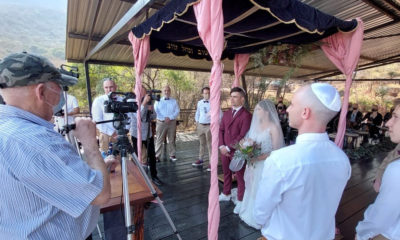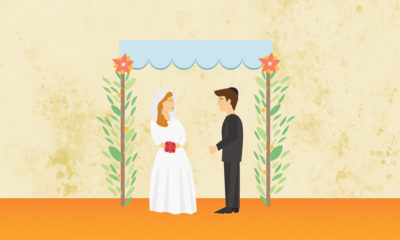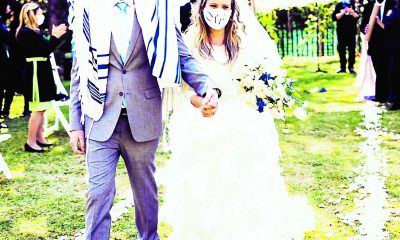
Featured Item

Real-life wedding singers give us the chuppah on simchas
Published
1 year agoon
When a recently dumped wedding singer hits notes of misery at joyous celebrations, it’s the love of a waitress working at the same functions that brings him new hope. As Hollywood marks the 25th anniversary of the classic Adam Sandler “rom com”, The Wedding Singer, we chat to some of our community’s real-life wedding singers to see what really goes behind the scenes of a simcha.
They may not have met their soulmate while performing, but our community’s singers add a dose of magic to every simcha. Chatting to us amidst the rush that is the pre-Pesach wedding season, they reveal that after being derailed by the COVID-19 pandemic, full-scale celebrations have made a comeback.
“There was a lot of talk that people were loving these small, intimate weddings,” says Moshe Lichtenstein, lead singer and co-founder of The Chupa Band. “But although there was a gradual start with small crowds, as the restrictions lifted, so the guestlists increased on a sliding scale until we were back to guest lists of up to 400 people and more.”
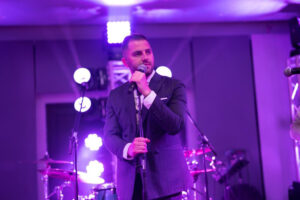
Having lost their bass guitarist Jason Green to COVID-19, The Chupa Band endured far more than the typical challenges musicians faced during the pandemic. Yet it remained dedicated to empowering musicians and creating full-scale wedding productions from chuppahs to horas to benching, sometimes even collaborating with musicians from the Johannesburg Philharmonic Orchestra to provide orchestral chuppahs.
He’s a recording artist with original songs streaming on Spotify and also fills the role of chazan of Sydenham Shul, but Lichtenstein remains passionate about performing at weddings. “The ability to work with young couples as they start their homes and to elevate Jewish simchas through music is the greatest privilege,” he says.
Wedding singer, performer, and chazan of Linksfield Shul, Shmuli Brill agrees. “I love music. Performing at weddings is my favourite part of singing, especially at the chuppah when the bride and groom walk down the aisle and when I sing the sheva brachot (seven blessings) and Im Eshkacech Yerushalayim. I really get emotional. Music is a massive part of a wedding day, and when I sing and get into the mood of the simcha, everyone else does too.”
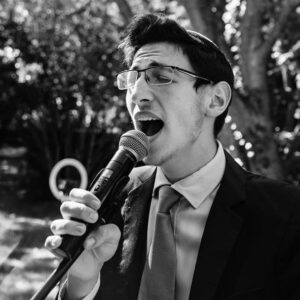
Being asked to sing You’ll Never Walk Alone, Liverpool Football Club’s anthem, took one particular chuppah to another level, for both the groom and for Brill, who is a dedicated Liverpool fan. “I sang it with extra passion,” he laughs. “I integrated Hebrew words into the song, and everyone joined in when I sang the original chorus in English – it was special.”
Born in Israel into a musical family, Brill moved to South Africa at the age of 10. His considerable singing talent was soon recognised. From the age of 11, he was called to sing at Sunny Road Shul. After his Barmitzvah, Brill became the shul’s chazan. There, he caught the attention of singer and performer, Ezra Altschuler, who brought him into the wedding market. Brill, who was 14 at the time, has been singing at chuppahs and receptions ever since.
Also growing up singing, Baruch Raff later formed the Lechatchila Band with his cousin, keyboardist Meir Raff, which is very popular in the Johannesburg religious wedding circuit.

“Weddings are such a happy bubble, and I often find myself chuckling on stage when I see some of the antics going on down below,” says Raff, reflecting on the humour that often punctuates such simchas. Yet his funniest experience as a wedding singer wasn’t actually at the event itself, but rather on the way home, when he and Meir were pulled over.
“The traffic cop wanted to breathalyse me, which I was happy to do, but I told him that we were wedding singers on the way home from a wedding, and that we hadn’t been drinking,” Raff recalls. “He told me to get out of the car and sing him a song. So, there on Grayston Drive at 00:30, I was belting out the song Baruch Hashem.”
Dean Witz, the vocalist for Jewish band The King’s Men, has also been singing since childhood. Beginning his more than 20-year stint in the Pretoria Shul Choir at the age of seven, he ultimately became choir master. Initially singing at chuppahs as a teenager, Witz later formed The King’s Men which provides full music and sound packages for weddings and other simchas.

Witz says reality is very different to The Wedding Singer. “In the movie, you often see Adam Sandler walking off and someone else taking over. In real-life, the function falls on you and the band, so you’re going nowhere. There’s also not nearly as much tzoris at weddings,” he laughs.
Aside from being able to work with couples to plan their wedding day and create lasting memories, Witz also enjoys the camaraderie he’s established with other wedding suppliers. “We’ve all gone through a lot together, especially during the pandemic, and now it’s great to catch up, pull together, and do what we’re passionate about.”
Well-known Jewish singer Choni G performs at simchas throughout South Africa and around the world. Naturally musical, Choni started out as a child soloist in the Sydenham Shul Choir – the shul his father Rabbi Yossi Goldman led. Forming a solid foundation in this and other choirs, Choni was ultimately chosen to tour America as a backing vocalist for world-renowned Jewish musician Matisyahu.
Later performing at a high-profile wedding in South Africa, Choni’s popularity as a wedding singer grew by word of mouth. In 2014, he moved to Cape Town to become the chazan at Gardens Shul, and steadily established his reputation as a premier wedding singer. Though he works on multiple music projects, Choni has carved a niche for himself on the local and international Jewish wedding circuit.
Over the years, he’s witnessed four grooms injure themselves during hora dancing, which he describes as a “Jewish mosh pit”. Yet, something that Choni is particularly proud of is #bringingbenchingback, where he has made benching (grace after meals) less a time where less religious guests typically duck out for a drink or smoke, and more of a drawcard. He does this by using a fusion of chords to meld traditional benching tunes with well-known pop songs, and getting people onto the dance floor.
“Having secular people tell me this is a highlight for them is huge,” he says. “I’m trying to bring the meaning of the words and the spirituality and holiness of Judaism out through my singing. This is one of my missions.”





